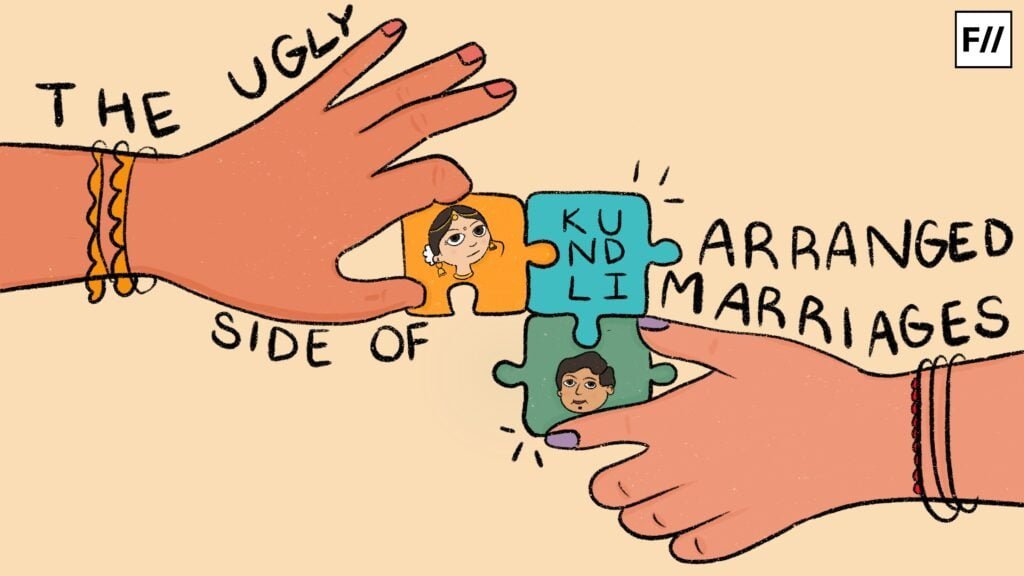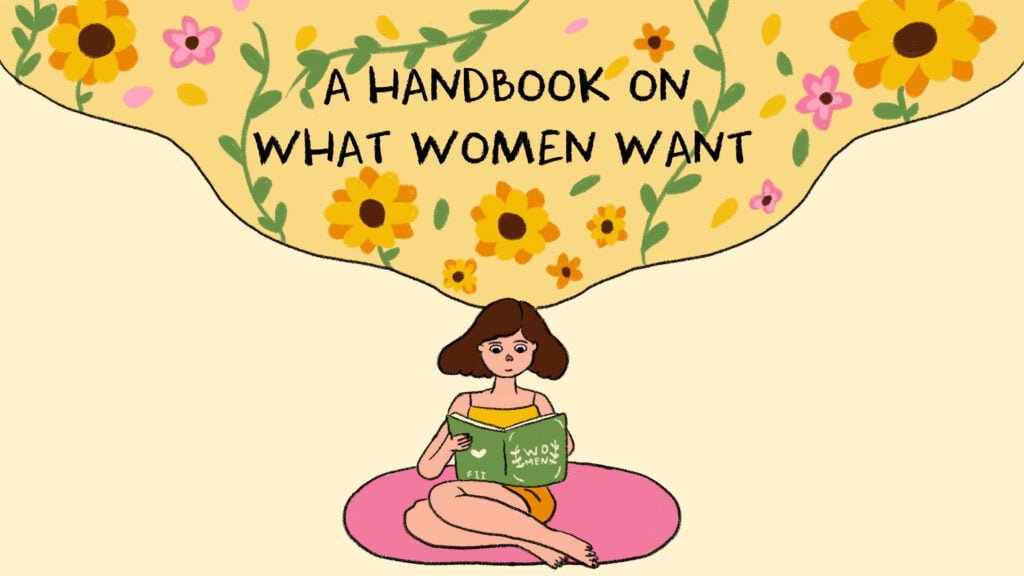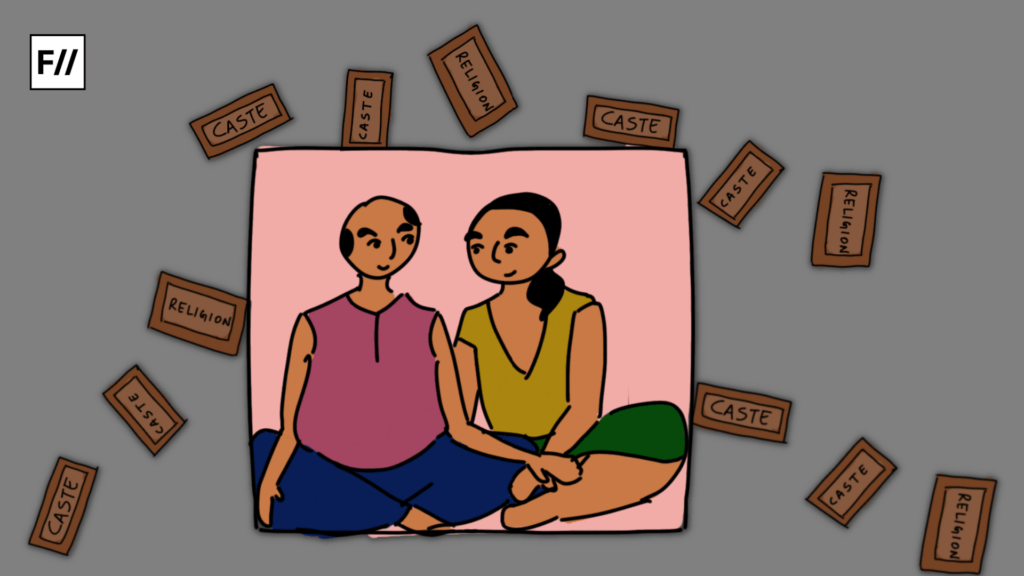Editor’s Note: FII’s #MoodOfTheMonth for February 2023 is Love In Post Modern India. We invite submissions on this theme throughout the month. If you would like to contribute, kindly refer to our submission guidelines and email your articles to shahinda@feminisminindia.com
When you’re Indian, marriage is a prospect that looms over all of us especially girls from the day we are born. Some look forward to it, some don’t, but the general perspective is that in the end, it will come, whether you like it or not. You will either walk into its jaws willingly or you will be dragged along kicking and screaming by well-meaning friends and family.
The older generation will tell you it is pain and torture — a demotion from a life of your choice to a life of duty and responsibility. The younger generation will tell you it is sunshine and love and flowers. And we’re all confused.
Arranged marriage lies in the middle of customs and norms in the upper-middle-class Indian experience. While rural and suburban people may or may not be given this freedom of choice, the upper-middle-class Indian generally is given the opportunity to find love at some point in their life. If he or she finds a partner which is acceptable to the family, they may proceed. If not, they must enter the gauntlet that is the arranged marriage process.
Any insights in this article about the arranged marriage process come from the arranged marriage community on Reddit, where hundreds of aspiring suitors discuss expectations, meetings, weddings, and love.
Also Read: How Does Online Dating In Hyperreality Look Like?
It is obvious that a topic such as this brings out the most overt sexism in people. Reddit is mainly occupied by young men, and the arranged marriage subreddit is a similarly male-dominated space. On top of that, there is some selection bias ongoing, as people on the arranged marriage subreddit are more likely to be those who are struggling with the process, instead of those who have successfully found themselves in happy relationships. Those who are struggling may be struggling due to their overt sexism, and hence the community feels more tilted towards misogyny than what is out there.

At the same time, it is important not to forget the forest for the trees here. Most of the discussions about arranged marriage on the subreddit, such as discussing expectations, compatibility, and deal breakers for their prospective partners is a huge upgrade from the past, where the prospective brides and grooms had little to no say on their choice of spouse.
The fact that both men and women are becoming more involved in the process and can choose someone out of an arranged marriage pool indicates a shift to a “love-arranged” marriage, where men and women use arrange marriage networking methods, like matrimonial sites or family networks, to simply meet suitors before going through a period similar to dating. This means that matches are often simply more compatible and have higher rates of success than in previous generations. These are significant improvements in the modern era, and must not be forgotten.
Yet, there is much to deconstruct here. Arranged marriage and the culture surrounding it still build upon a few fundamental ideas and concepts, which I shall attempt to categorise below:
The Assumption of Inevitability is the idea that marriage is inevitable. Not just inevitable, but that it was impossible to live a happy, fulfilled life without a heterosexual marriage within the bounds of society. Whether it was love or arranged, it had to exist, and life would be miserable without it. Your choices are extremely limited by this worldview — you are no longer choosing between singlehood and monogamy, monogamy is the default. You are instead choosing between options of suitors, which means that you have to settle for the least evil of the lot.

It does feel like many in the minefields of arranged marriage consider even the least compatible marriages better off than a fulfilled life without a romantic partner, which leads to many, many hasty marriages which simply should not have happened.
Also Read: Gender Gap In Orgasm: Sexual Intimacies And Inequalities
Assumption of Persistence claims that marriage, in Indian terminology, never really ends. It simply goes on and on and on, till death do us part. Because the fundamentals of an Indian arranged marriage are not love, but a “rite of passage“, or a cultural mandate, its conditions for dissolution also vary. No longer is “loss of love” a good enough reason to divorce. Because marriage is simply two people being together to be a unit of society and to procreate, these are the only two reasons which allow for dissolution — a lack of procreation and a lack of societal acceptance.
This leads to a vicious cycle — if your marriage was mandated by society, through the arranged marriage industrial complex, you are accepted as a part of society, and you no longer have reason to break up. You’re together for life, suck it up.
The Assumption of Interference assumes that it is quite normal for the rest of society to take quite a keen interest in a potential suitor’s affairs. Especially, this refers to the parents of the potential bride and groom. For the international audience, it is quite unthinkable for parents to take such a keen interest in their children’s personal lives. They may wish their children to be happy, or even to get married and have a family, but the idea of quite literally formalising a process where they get to vet and approve potential suitors seems quite foreign.
What these assumptions indicate is that there is still a long way to go before arranged marriage can truly exist as a healthy way for young men and women to meet and form meaningful relationships. For society to heal from cycles of generational trauma due to unhealthy parental relationships, it needs men and women to be with each other because they want to, because they like and respect each other, not because of any societal pressure.
Arranged marriage is also not a gender-neutral process. Given that men are overrepresented on the subreddit, it it is common to see their gripes with gendered expectations — they are expected to earn high salaries and provide cushy lives for their wives free of parental interference. The occasional post by women on this subreddit reveals their gripes with gendered expectations — they are expected to be traditional, good-looking, and overly accommodating, to the extent of giving up their beliefs and careers.

Taking another look at the assumptions and consequences we have spoken of earlier, I would wager that each one of them affects women far more harshly than it affects men. Speaking of the assumption of inevitability, Indian men have both more time and more freedom to choose their partner, with lesser judgement for unmarried men than unmarried women. The assumption of persistence is also stronger for women, with more stigma for divorced women than for divorced men.
Women are traditionally also given less freedom in the decision-making process and judged more heavily for dating before marriage in a conservative society. While it is now common among urban men and women to look for partners in the arranged marriage process on an equal footing, it has to be acknowledged that they are on unequal playing fields. There is a long way to go before this process can become truly gender-neutral, or feminist.
This article only speaks of educated, urban women and men here. This is not the majority of women in India. The majority of women in India have not received this freedom and do not have the power to escape the past as urban women do. While Indian women fight for their rights, and while Indian men grow with evolving society or refuse to, women in rural parts of the country have neither the means nor the opportunity to change their situations.
Also Read: My Battle Against Family, Caste Hierarchy & Forced Arranged Marriages
In fact, with a growing group of urban men dissatisfied with urban women, they are further at risk of exploitation. Almost comparable to American men importing Asian women to be their wives, it is probable that Indian men will rely on power imbalances of caste and class to maintain their illusion of power.
This is a call to action specific to the urban feminists who have escaped patriarchal traps — do not forget about the women who do not have the opportunities you do. Do not leave them behind.





